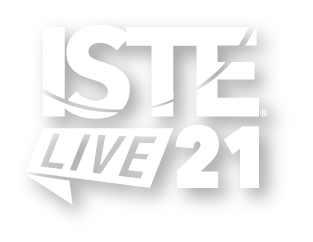

Infusing Computational Thinking Into Everyday Elementary Curriculum – Yes, You Can! |
Explore and create : Creation lab
Dr. Julie Evans David Gomez Dr. Kari Stubbs
Using results from a new professional learning project in New York City schools, this lab activity will introduce elementary teachers to proven strategies and tips for seamlessly integrating key computational thinking components (pattern recognition, decomposition, abstraction, algorithm design) within everyday English language arts, math, science and social studies lessons.
| Audience: | Principals/head teachers, Teachers, Coaches |
| Skill level: | Beginner |
| Attendee devices: | Devices required |
| Attendee device specification: | Laptop: Chromebook, Mac, PC Tablet: Android, iOS, Windows |
| Topic: | Computer science & computational thinking |
| Grade level: | PK-5 |
| Subject area: | Computer science, STEM/STEAM |
| ISTE Standards: | For Students: Computational Thinker
|
| Influencer Disclosure: | This session includes a presenter that indicated a “material connection” to a brand that includes a personal, family or employment relationship, or a financial relationship. See individual speaker menu for disclosure information. |
Many recent reports, media stories and research findings describe the current state of computational thinking (CT) in our nation’s schools. Project Tomorrow’s recent white paper on the integration of coding activities within curriculum in K-8 classrooms echoed similar themes and identified many of the same issues as described in these other sources. Whereas we can point to individual teachers and even schools that have infused CT within their curriculum and academic culture, those instances are not the norm. The perplexing challenge is how to systemically and effectively help teachers develop both a readiness and a capacity for the integration of CT within their daily instruction across all core curricular areas. This problem has two arms. First, understanding how teachers adopt new instructional practices and then integrate those new practices seamlessly into their classroom activities and maintain those practices as a regular “habit” requires us to rethink conventional wisdom on professional learning (PL) and teacher support. Second, institutionalizing that process into a model that is sustainable, replicable and scalable demands that as we also rethink critical success factors for instructional models. We are currently in year 2 of a multi-year professional learning and research study with teachers and leaders at 10 New York City schools on how to address both challenges. In this lab session, we will leverage what we have learned from our NYC project to help other elementary teachers learn how they can infuse computational thinking concepts within their everyday curriculum on a regular basis. We will repurpose three sets of tools that we have developed for this project in this session. First, we will introduce the teachers to the idea of their own readiness to computational thinking integration by having each participant complete our teacher assessment survey. This assessment survey helps us in our project determine what specifically teachers need from our CT coach to develop greater CT confidence, competency and capacity. In the lab setting we will use that tool to help pair educators with peers at similar readiness levels for more effective co-learning. Second, we will facilitate learning experiences where the lab participants act as students in grade level appropriate unplugged CT activities that directly support ELA, Math, Science or Social Studies curriculum standards. We have found that these types of activities help educators see the connections between CT concepts and their curriculum standards prior to introducing coding into the mix. We lead with the curriculum goals which resonate with the teachers. Third, working in teams, the lab participants will then replicate those curriculum-aligned unplugged experiences using either Scratch or Vidcode in a project-based learning setting. Within our NYC project, we use BrainPOP’s Creative Coding projects as a way to ease educators into coding. The project orientation of the Creative Coding resources is more educator-friendly for many elementary teachers in particular. Working in concert with one another, these activities help the lab participant understand their own readiness for CT professional learning, and how to re-think their approach to CT integration within everyday curriculum. Our goal is for each participant to gain greater confidence in their ability to do this integration work, and to take back to their schools and classrooms new strategies for advancing their own learning and supporting new opportunities for student CT learning experiences.
The first-year results from our project in NYC are very promising. At the end of a hectic school year in NYC where we pivoted our program model from face-to-face to virtual mentoring and coaching, we were very pleased to see that through the utilization of this approach, our project teachers increased their confidence and competency with CT integration in their classroom. 52% of our project teachers for example reported that they integrated CT concepts within an existing lesson or unit as a result of our coaching and tools; only 18% had done that previously. 43% said they were now providing their students with regular opportunities to use coding as the means for demonstrating knowledge or proficiency; only 24% had been doing that previously. We believe that results such as these demonstrate the efficacy of this model which we will employ in this lab environment.
Based upon our proposed 90 minute lab:
Introduction and warm-up “getting to know you” activity that mimics the CT principle of decomposition (10 minutes)
Review of key CT concepts and principles (5 minutes)
Discussion on teacher readiness for CT integration utilizing Project Tomorrow research data (5 minutes)
Completion and self-scoring of the CT readiness assessment (10 minutes)
Pairing of readiness-aligned peers for a series of 2-3 unplugged learning activities in ELA, Math, Science and/or Social Studies (15 minutes)
Introduction to curriculum-aligned Scratch and VidCode sample projects developed by teachers in NYC using the BrainPOP Creative Coding resources (15 minutes)
Small teams develop their own coding project for an ELA, Math, Science or Social Studies lesson. Project will address key grade level curriculum standards and would be applicable for integration within everyday classroom curriculum (15 minutes)
Gallery walk to see the projects developed and talk collectively about the CT concepts utilized and the process of development for elementary students (10 minutes)
Wrap Up: Review of additional resources provided by Project Tomorrow to support ongoing professional learning and completion of the session evaluation (5 minutes)
Robin Hood Computational Thinking Concept Paper https://www.robinhood.org/uploads/2018/08/Computational_Thinking_Concept_Paper_2018.pdf
Project Tomorrow Report: Coding in K-8 Classrooms: Empowering A New Generation of Creators
https://tomorrow.org/speakup/coding-report-2019.html
Katherine Hayden: Computational Thinking through Non-Programming Science Activities
https://dl.acm.org/doi/10.1145/3159450.3159520
Julie Randles: Teach coding and computational thinking to elementary students
https://www.iste.org/explore/teach-coding-and-computational-thinking-elementary-students



VP of Strategic Alliances at BrainPOP and proud former ISTE board member. I've been a regular speaker at ISTE for years - presenting on a multitude of topics including computational thinking, equity, STEM, critical thinking, mobile learning, UDL, and more! Other conference appearances include UNESCO Mobile Learning Week (Paris), SXSWedu (Austin), 21CL (Hong Kong), FETC (Orlando/Miami), and IEI Summit (San Juan). I look forward to engaging with educators and industry experts at ISTE 2021! https://www.linkedin.com/in/karistubbs/